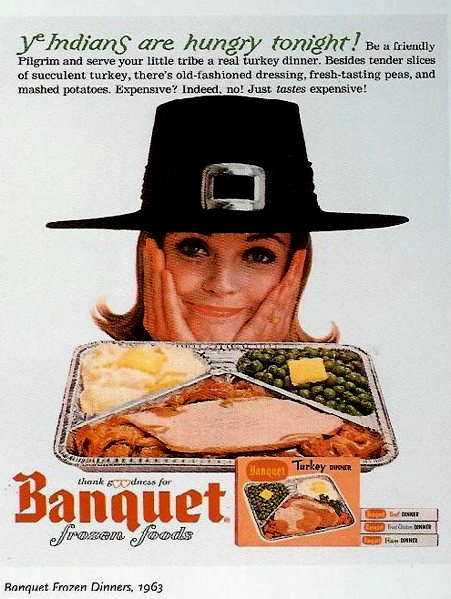Can I Blame the Capitalists for Turkey?

I guess I had missed how right-wingers came to claim Thanksgiving as the ultimate celebration of free enterprise, but they sure have. The historian Lawrence Glickman has a fascinating article on how this happened.
Google “Thanksgiving” and “free enterprise” and you will find links to articles on conservative and libertarian think tank websites with titles like “How Communism Almost Ruined the First Thanksgiving,” “Thanksgiving is a Celebration of Free Enterprise,” and “Thanksgiving, Socialism, and Free Enterprise.” These pieces, remarkable in their ideological consistency, are the product of decades of mythmaking, begun before the internet was a glint in Al Gore’s eye.
Making use of excerpts from Plymouth Colony Gov. William Bradford’s journals, all of these pieces tell roughly the same story about “the real meaning of Thanksgiving”: the Pilgrims went to Plymouth in 1620 with a utopian vision of holding property in common, but after being mugged by the reality of two years of poor harvests and starvation, they abandoned collectivism for capitalist individualism. These articles conclude in roughly the same way: The lesson of the first Thanksgiving was that “socialism does not work; the one and only source of abundance is free markets.” What’s more, many of the pieces claim, this true history has been suppressed, “deleted from the official story,” “no longer told in the textbooks because it is thoroughly unPC.”
Hoo boy
The narrative of free enterprise Thanksgiving was a proxy skirmish in the battle between conservatives and New Deal liberalism and its emerging welfare state, which many critics on the right conflated with socialism and even communism. In claiming Thanksgiving, a holiday associated with family, abundance, and Americanism, these critics sought the legitimation of history for their view that security underwritten by the state was not only un-American, but the path to authoritarian socialism—a charge that took on particular force during the Cold War, when this narrative of “free enterprise Thanksgiving” was born.
The first use I’ve found of the argument that Pilgrims found success by rejecting socialism appeared in 1920, a time when, according to an editorial in the South Idaho Journal, the story had “special significance” as “theories of socialism are running rampant throughout the world.” But the narrative of Thanksgiving as a vindication of free enterprise capitalism was widely popularized in the late 1930s and early 1940s, and gained momentum in the postwar years, as critics of expansive Rooseveltian liberalism sought to find a usable past to justify their dislike of his popular New Deal. By claiming that the Pilgrims rejected a philosophy that they analogized to New Deal liberalism and embraced free enterprise capitalism, these critics sought the sanction of history for their view that, as a political columnist wrote in 1952, “in recent years this love of liberty has been subordinated to an alien philosophy of security” and “the siren song of the welfare state.”
It goes on.
I’ve long been fascinated by the ways in which conservatives try to hijack anything and everything to fit their worldview. Go to the Oklahoma History Museum in Oklahoma City and see how indigenous trading networks are PROOF that “free enterprise” is the natural way of economic interactions if only you keep the LIBS out of it.
So if your racist uncle on Thursday starts talking about Thanksgiving as a way to own the LIBS, you will at least know where this hogwash comes from.
